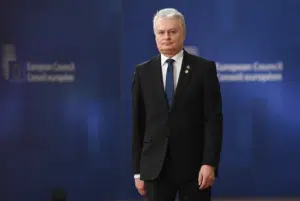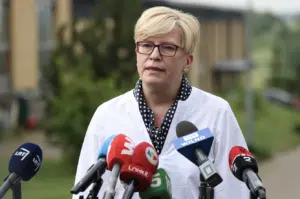Brussels – It will be a re-run of the head-to-head contest between Ingrida Šimonytė and Gitanas Nausėda staged in 2019, although the political and international environment has changed a lot since then for Lithuania, which has arrived at its first super-election year. After the first round of presidential elections yesterday (May 12), the two challengers from five years ago will face battle again in the runoff set on May 26, amid internal tension in the EU member country over security risks stemming from the Russian threat in more than two years of war in Ukraine.

According to the results of the first round of voting, incumbent head of state Nausėda won 44.1 per cent of the vote, an early indication of the high probability of securing a second presidential term in two weeks. “Look how many leaders are elected in the first round in other countries in the European Union or the world in general; I’m not talking about those where presidents are elected with 98 per cent or so,” the candidate of the Social Democratic Party of Lithuania (Lsdp) and the Lithuanian Regions Party (Lrp) commented to the press about the failure to reach an absolute majority of votes to be elected at the first round, with a jab at the recent re-election (obvious and faked) of Vladimir Putin in Russia.
It is precisely on the relationship with Russia that all the candidates, eight in total, have set their campaigns, given the fear of the Kremlin’s expansionist policy shared across the Lithuanian political spectrum. Like the other Baltic and Eastern European countries, Lithuania was also part of the Soviet Union and was the first republic to declare independence in March 1990. More than three decades later—with the invasion of Ukraine continuing unabated—according to several national polls, more than half of Lithuanian citizens fear that the country could be among the targets of Russian aggression (despite being a member of NATO for exactly two decades). Vilnius intelligence has warned that Moscow is ready to strengthen its military capabilities along the border with Atlantic Alliance members.

Lithuania’s Prime Minister and candidate of the Union of the Fatherland – Christian Democrats of Lithuania (TS-LKD) in the 2024 presidential election, Ingrida Šimonytė
This is also why there is no difference between the positions of Nausėda and incumbent Prime Minister Šimonytė on the foreign policy and security front. Both are in favour of increasing defence spending to at least 3 per cent of Lithuanian GDP from the 2.75 planned for this year (the minimum threshold required of NATO members is 2), which should allow for the costs of modernising the army and infrastructure, but also for a German brigade to be deployed in Lithuania from 2027. Similarly, both presidential candidates advocate increasing military support for Ukraine’s defence, especially air defences. Of particular note is that both the head of state and the incumbent prime minister confirmed that they would have food stocks at home in the event of a conflict with Russia despite pledging to avoid this scenario.
However, substantial differences between the two challengers to the presidency can be seen on the civil rights front, such as same-sex unions, which Nausėda opposes, and Premier Šimonytė supports. “I have succeeded in making sure that those who support a Western Lithuania, where there is no place for homophobia or anything else that does not correspond to the principles of liberal democracy, will definitely have someone to vote for in the second round,” claimed the 19.86 per cent first-round starting base—down sharply from five years ago—the candidate of the centre-right Union of the Fatherland-Christian Democrats of Lithuania (TS-LKD). Šimonytė got the better of the incumbent president in the capital, Vilnius, and from there, she will seek a not-so-easy run-up to avoid the same result in 2019 and heavier political repercussions in the European elections (scheduled for June 9 in Lithuania) and the legislative elections on October 13. The president in the Baltic country represents the country at the top of the European Union and NATO and has a semi-executive role: together with the government, sets foreign and security policy, can veto laws, and has a say in appointing key officials.
English version by the Translation Service of Withub



